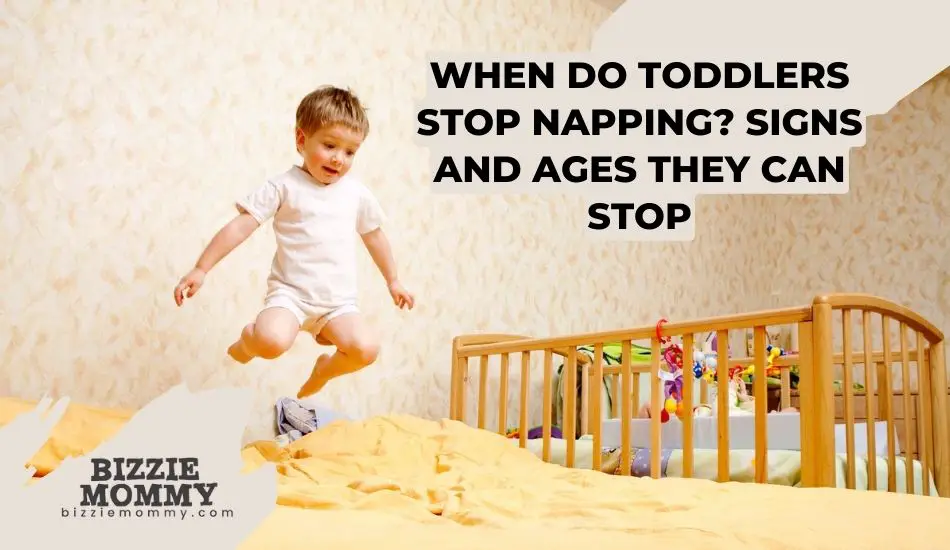You most likely remember the time your toddler used to sleep soundly during the day and night, having 2-3 naps a day. Research has shown that most toddlers start skipping their morning nap when they celebrate their first birthday, and when they turn 2, their nap time decreases. If you are also a parent of a toddler who is skipping naps, then you must be wondering, “When do toddlers stop napping?”
Most research carried out in this aspect shows that most toddlers start skipping naps when they are about to turn 3. Not all toddlers follow the same biological science; therefore, there is no specific age they’ll start skipping naps. As they get closer to their 3rd birthday, you’ll start noticing that they’ll be able to stay awake for longer periods, nap time may decrease, they may skip their afternoon nap, and they face trouble falling asleep.
The classic sign is they have a hard time going to bed, even crying saying they don’t want to sleep. However, this is not the case with everyone, as some toddlers always resist naps even when they are tired. Additionally, there are some tough days when a child doesn’t feel like having a peaceful nap. In that case, give him some time and try changing his daily routine. A tough and tiring routine will make him sleep early, and he may get an extra nap a day. Moreover, a toddler can be influenced by older siblings when they are skipping naps.
When Will My Toddler Skip Naps?
There is no exact age when children stop napping, as many factors influence it like the night sleep of the toddler, his daily activities, preschool, and sensibility. But as mentioned earlier, according to much research on this matter, most of them start dropping naps around 3 years of age, face trouble falling asleep, and their nap time also decreases.
With advancing age, some kids stop napping, while a few others take one nap per day. About 94% of toddlers give up naps when they turn 5. If your kid has turned 7 or 8 years of age and still naps, try consulting a physician, as he may have some sleep disorder.
However, if he’s a preschooler and you’re trying to trace his sleeping habits and want to improve them, check if he has the following. If he does, then he is ready to stop napping:
- If he takes more than 30 minutes to sleep at night.
- If he is resisting naps for a few weeks.
- If he wakes up early in the morning.
- If he wakes up from his night sleep and faces difficulty falling asleep again.
- If hasn’t turned 2 yet, he may be going through a sleep regression. Sleep regression is a temporary state when a baby starts facing no-nap days and struggles to fall asleep. It is a sign of the developmental changes your child is going through.
However, if he is a preschooler and about to turn 3, skipping naps is a positive sign that he’s growing and developing mature habits.
What Are Some Signs My Toddler Should Stop Napping?
Your toddler can continue napping if he shows signs of overtiredness like:
- Creating fussiness when awake.
- Crying a lot.
- Showing aggression and less interest in things.
- Not eating food easily and you struggling to feed him.
- Difficulty focusing on games and other things for longer periods.
However, if he’s going to turn 3 and starts showing these 3 signs, it’s time he should stop napping.
Overactive
Toddlers around 3-4 years are the most active. They show less interest in naps and spend most of their time playing games and roaming around, giggling, and laughing. If your toddler is active and doesn’t get tired easily, it’s time to stop napping and build his scheduled nap time.
Struggles to Fall Asleep
If your toddler struggles to fall asleep at night or during a daytime nap, it is a sign that he is ready to develop his habits and should stop napping.
Wakes Up Early From a Nap
Apart from resisting naps, if he wakes up early from his toddler sleep, it shows that he’s not tired enough to sleep for longer periods.
Skipping Naps
During sleep regression when kids stop napping, they seem exhausted and overtired. But, when a toddler is transitioning from his afternoon nap to only night sleep, he doesn’t seem cranky or fussy. So, skipping afternoon naps without any negative side effects shows that your kid is ready to skip his occasional nap, and you don’t need to worry about it.
What Do You Do When Your Toddler Stops Napping?
Parents need to support their kids in this time of transitioning to no naps. It may take some time but eventually, they’ll be able to adjust to this routine. Studies have shown that replacing nap time with quiet time has a positive influence on the baby’s daily routine.
Quiet activities for the baby may contain solving puzzles, reading a book, or drawing on paper. Some parents try involving their kids in stressful activities and as a result, their kids start skipping quiet time and prefer naps.
Quiet time is essential for their baby to recharge his body for the rest of the day. There are some preschool and toddler daycares that offer this quiet time as a part of their daily activities. Some peaceful and quiet time allows a kid’s brain to ponder and recover and also helps in memory consolidation.
In addition, when toddlers skip naps, they’ll surely need longer nighttime sleep. It’s the parents’ responsibility to make bedtime earlier for them and dim all the lights to create a sleepy environment. A perfect nighttime sleep of at least 13 hours is essential for the growth of his body and mind. So try adjusting the baby’s schedule to give him the proper rest he needs for the day.
Why Are Naps Healthy for Toddlers?
Naps are a source of meeting the sleep needs of an individual. Kids need more naps than adults because they get easily tired and frustrated from their daily activities. They need to take 14 hours of nap time 2 to 3 times. Some toddlers have trouble getting sleep at night, so naps during the daytime are a great source of refreshing and recharging them for the rest of the day.
If your baby is getting proper daytime napping, he’s surely getting the energy and peace of mind he needs. However, when toddlers turn 3, they start skipping or resisting naps. Some of them show crankiness, fussiness, and an angry mood, while others feel and act normal.
Naps are a way to repair the body and mind for the whole day. Not only this, some researchers claim that growth hormones are secreted during sleep. Those toddlers who skip naps and don’t fulfill the sleep requirements show growth retardation. Hence, proper sleep is a requirement for healthy growth.
Toddler Transitioning To No Naps

Toddlers show the transition from 3-4 daytime naps to no naps when they turn 5 years of age. You can’t expect a 5-year-old to sleep like a 5-month-old infant. Sleeping habits keep changing with time and age.
Here are some key points you can follow if you are experiencing a tough time with the sleeping habits and nap transitions of your baby.
Give Him Nighttime Sleep
Set your toddler’s regular bedtime and make his bedtime 6:00 to 6:30 pm. He also needs a 6-8 hours wake time before his sleep, so make sure he doesn’t sleep during this time if you are trying to set his daily routine.
Set A Routine
A routine is essential to track his playtime and sleeping schedule. Wake him up early at the same time daily and give him food at proper times too. Allow him to play games and other activities for certain amount of time. Following a bedtime routine will make him responsible and well aware of the importance of a routine in daily life.
Give Them Some Quiet Time
As mentioned earlier, some quiet time instead of a nap is necessary for his mental and intellectual growth.
Don’t Force Them To Nap
Forcing your toddler to lay down on his bed and take a nap will not help set his routine. If he has turned 5, he’ll surely resist naps and will create trouble if you try to make him sleep. Children of this age try to set their daily cycle naturally to make themselves more productive.
Final Verdict
Skipping naps or transitioning to no naps at the age of 3 to 5 is pretty normal. Many parents struggle with it at first, but they eventually learn to set their toddler’s proper routine and sleep time. Make sure to consult with a medical professional if your toddler shows immense changes in his behavior during his transition to no naps at all.

